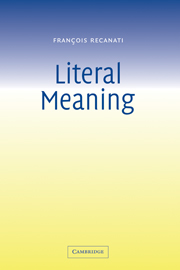Book contents
- Frontmatter
- Contents
- Acknowledgments
- Introduction
- 1 Two approaches to ‘what is said’
- 2 Primary pragmatic processes
- 3 Relevance-theoretic objections
- 4 The Syncretic View
- 5 Non-literal uses
- 6 From Literalism to Contextualism
- 7 Indexicalism and the Binding Fallacy
- 8 Circumstances of evaluation
- 9 Contextualism: how far can we go?
- Conclusion
- Bibliography
- Index
6 - From Literalism to Contextualism
Published online by Cambridge University Press: 08 January 2010
- Frontmatter
- Contents
- Acknowledgments
- Introduction
- 1 Two approaches to ‘what is said’
- 2 Primary pragmatic processes
- 3 Relevance-theoretic objections
- 4 The Syncretic View
- 5 Non-literal uses
- 6 From Literalism to Contextualism
- 7 Indexicalism and the Binding Fallacy
- 8 Circumstances of evaluation
- 9 Contextualism: how far can we go?
- Conclusion
- Bibliography
- Index
Summary
Five positions
I take it that there currently are five basic positions concerning the role of context in the determination of truth-conditions. I have already attempted to refute two of these positions. Before proceeding, it will be helpful to identify all five, and to take a bird's eye view of the theoretical landscape.
The five positions I am about to list can be ordered on a scale, one end of which is occupied by the extreme position I call Literalism, and the other end by another extreme position, which I call Contextualism. Of the intermediate positions I will describe, some fall on the literalist side and others on the contextualist side, depending on where they are situated on the scale (see table 6.1, p. 86).
The debate between Literalism and Contextualism was at the forefront of attention in the philosophy of language of the middle of the twentieth century. It is widely believed to have been settled (in favour of Literalism in some version or other) but I think that is a mistake. The alleged refutations of Contextualism that have been offered actually refute nothing; while Literalism strikes me as by and large indefensible. So I think the history of twentieth-century philosophy of language ought to be rewritten. I will not do so in this book, however.
Information
- Type
- Chapter
- Information
- Literal Meaning , pp. 83 - 97Publisher: Cambridge University PressPrint publication year: 2003
Accessibility standard: Unknown
Why this information is here
This section outlines the accessibility features of this content - including support for screen readers, full keyboard navigation and high-contrast display options. This may not be relevant for you.Accessibility Information
- 1
- Cited by
